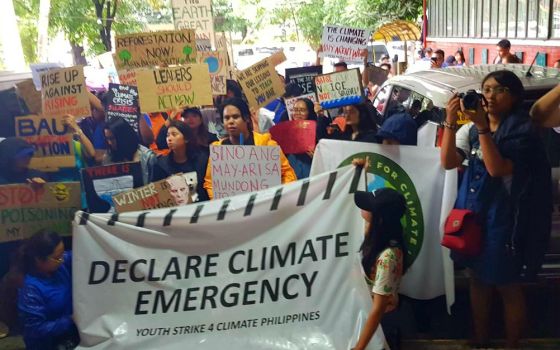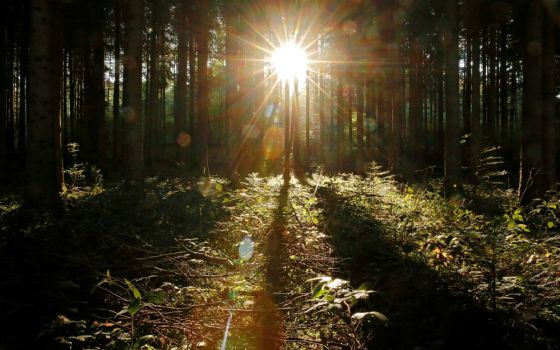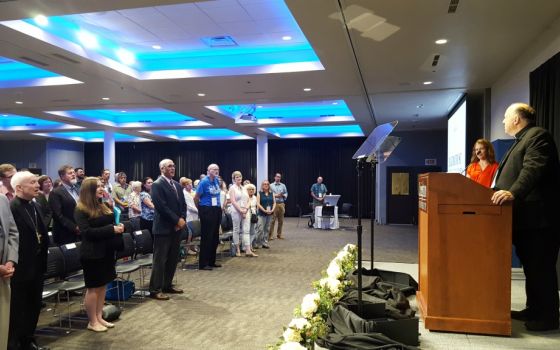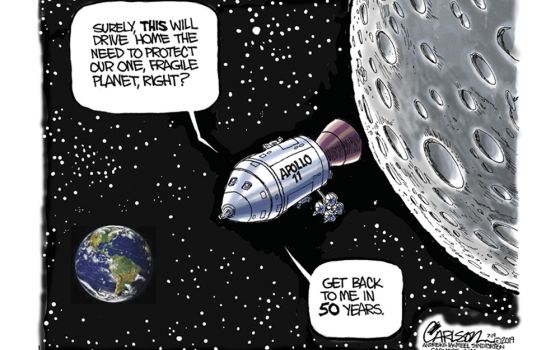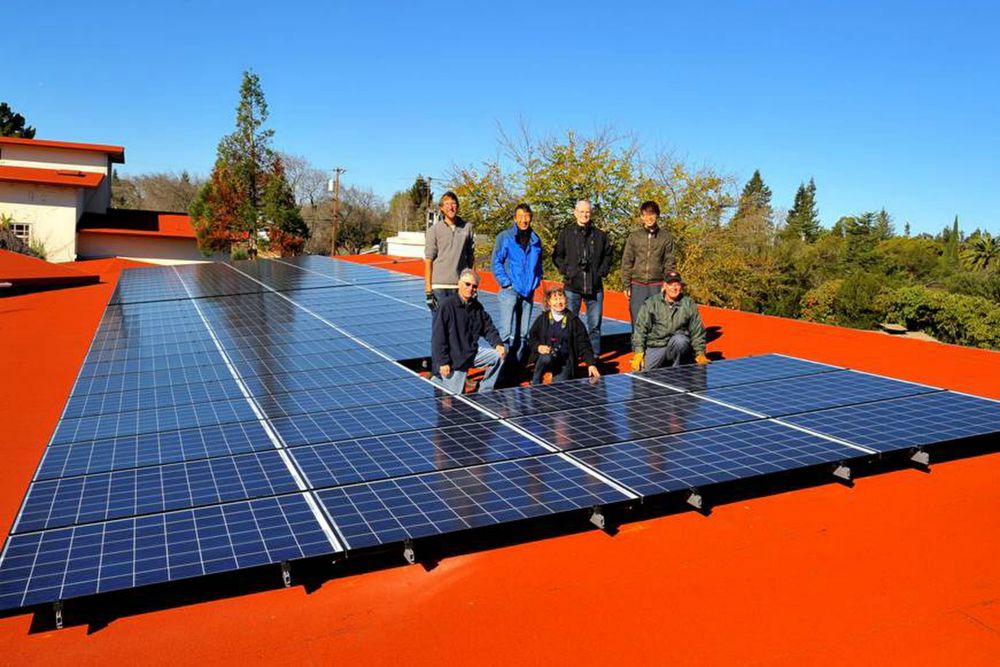
Parishioners of St. Thomas Aquinas in Palo Alto, California, pose next to solar panels in this undated 2015 file photo. (CNS/Courtesy of St. Thomas Aquinas Parish)
Marking the fourth anniversary of Pope Francis' landmark social encyclical on the environment, the Catholic bishops of California issued their own sweeping pastoral statement on threats to the state's many ecosystems, inviting the church community and all Californians "to contribute to the ecological well-being of our state."
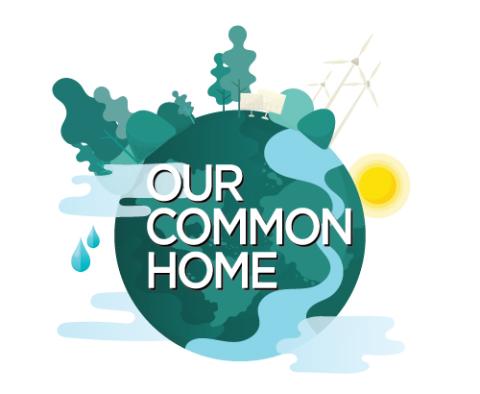
(NCR/Freepik)
The 19-page pastoral statement, titled "God Calls Us All to Care for Our Common Home," was released Tuesday by the California Conference of Catholic Bishops, comprised of the two dozen bishops that head the state's 10 dioceses and two archdioceses. It represents one of the most wide-ranging engagements to date by the U.S. episcopacy in taking up "Laudato Si', On Care for Our Common Home," Francis' encyclical on the environment and human ecology made public June 18, 2015.
Within the statement, the bishops reflect on "the rich, natural beauty of California" and how its history has witnessed periods when people have cared for and defended its diverse ecosystems, while at other times have exploited its land, resources and inhabitants. They go on to offer a series of action steps for the state's residents — including nearly 11 million Catholics, or 28% of the population, according to Pew Research Center — to better care for the earth, including pledging themselves to integrate Laudato Si' more fully into liturgies, explore expanded renewable energy and energy efficiency projects, and even begin a discussion about the possibility for divestment from fossil fuels.
Home to Yosemite, the lush Central Valley and towering, centuries-old sequoias and redwoods, California is widely recognized as a global leader on the environment, dating back more than a century to conservationist John Muir. California maintains nine national parks, more than any other state.
Last year, its lawmakers passed various measures to address climate change and set the state's electricity grid on course to become carbon-free by 2045*. Former Gov. Jerry Brown, himself Catholic and a former seminarian, attended in recent years several Vatican events on the environment, and upon the encyclical's release, called it an essential intervention "to wake people up to the dangers of climate change."
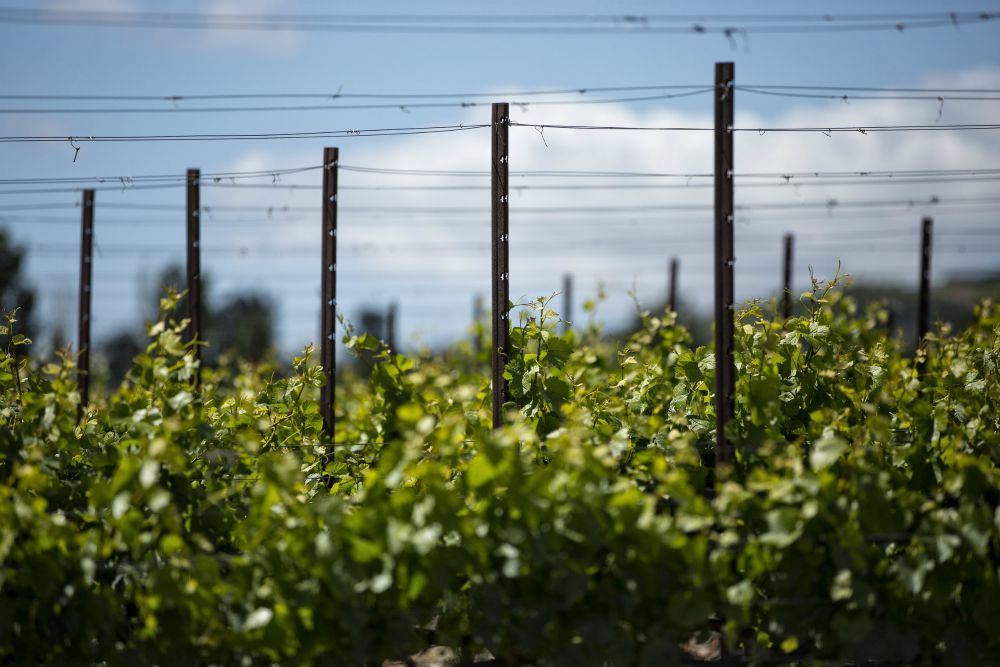
Grape vines grow along the California Mission Trail near La Purisima Mission State Historic Park in Lompoc. The first wine grapes in California were planted by Franciscan missionaries in the 1700s. (CNS/Nancy Wiechec)
"Our state's great beauty and bounty has stirred the spirits of generations to act on behalf of environmental protection and for the justice that ensures the integrity of the land and its people," the bishops' statement reads. "For these reasons, the Bishops of California find it both fitting and necessary to reflect on Pope Francis' encyclical Laudato Si' and its message of care for God's creation."
The idea for the pastoral document emerged several years ago in the San Bernardino Diocese, where its Laudato Si' committee suggested to Bishop Gerald Barnes that California's bishops issue a statement similar to the 1975 pastoral letter from the bishops of Appalachia. In April 2018, the bishops appointed retired Bishop Stephen Blaire of Stockton to chair an ad hoc committee on implementing Laudato Si' in California and drafting a pastoral statement. Long seen as a leader on environmental concerns, the 77-year-old Blaire entered hospice care last week.
The bishops outlined two purposes for the statement: "To animate and energize the implementation in California of what Laudato Si' calls us to do, and to offer a dynamic teaching and evangelization tool for our Catholic faith community and beyond, especially for young people."
The California Catholic Conference, the bishops' public policy arm, has created a two-page summary to be inserted into parish bulletins. In coming months, it plans to produce faith formation and study guides for small group discussions and to encourage educators to find ways to introduce the statement into various programs.The conference also plan to roll out a series of homily guides over the next year. Individual dioceses also are exploring their own distribution efforts, including through various environmental ministries.
Laudato Si' in California
In many ways, the pastoral statement reads like a miniature, localized version of Laudato Si'. It applies ideas raised by Francis in the encyclical to the current California context and weaves passages from the pope's apostolic letter into reflections about the West Coast state's varied geography and abundant biodiversity.
"What we wanted to do with this version is bring it down even closer to where people live, so that it was not something that people could just shrug off," said Franciscan Br. Keith Warner, a member of the committee that helped develop the document.
Warner, the director of education and action research at Santa Clara University's Miller Center for Social Entrepreneurship, told NCR that the bishops recognized the "dynamic teaching opportunity" that Laudato Si' has presented, particularly for youth. He noted that environmental protection is already ingrained among many young people, but they're often less aware that the Catholic Church has anything to say on the subject.
The bishops' statement, guided by the concepts of the common good and integral ecology, is divided into two parts: a reflection on the Golden State's environment and threats it faces; and a series of action calls to Californians ranging from young people and politicians, farmers and Hollywood, and church ministers and the bishops themselves.
"Our Catholic doctrine offers a rich teaching on the theology of creation and our role and meaning in the world," the bishops wrote in the introduction.
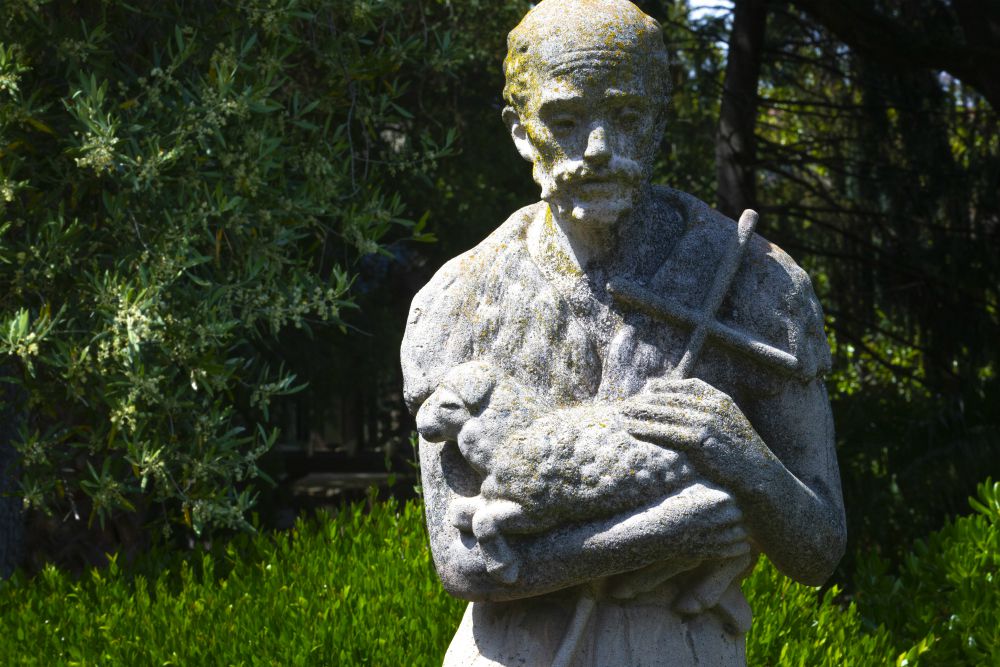
A religious statue is seen at St. Patrick's Seminary and University in Menlo Park, California, May 9. (CNS/Chaz Muth)
The document's first section, called "A Canticle of California," enlists characters from St. Francis of Assisi's 13th century hymn "The Canticle of the Creatures" — Sister Mother Earth, Brother Fire, Sister Water, Brother Wind — to examine challenges to the state's reisidents and landscapes posed by land use, wildfires, water access and climate change.
The bishops make clear that "A Catholic perspective on environmentalism is expressed by concern for creatures and land, but also for where people live, work, play, and pray," adding that Laudato Si' builds upon the state's active environmental justice movement.
"For too long, poor communities of color have been subjected to disproportionate pollution from landfills, dirty industries, and transportation corridors adjacent to their neighborhoods," the bishops wrote.
Throughout the document, the bishops detail how "the disruption of the earth's climate" is impacting the state. They call climate change "one of the principal challenges facing humanity today." The bishops detail how recent wildfires throughout California have grown more intense and destructive, exposed more people to hazardous smoke, and how warmer temperatures and decreasing mountain snowpack has strained the state's water systems. In March, California officially declared that its seven-plus-year drought had finally ended.
"[Climate change] is a serious moral problem with profound economic and social justice implications," the bishops wrote, pointing to the disproportionate harm poor and vulnerable populations experience from a warming planet. "… Climate disruption will exacerbate social and economic inequalities, which points to the need to prioritize strategies to help all those in need adapt to our new climate reality."
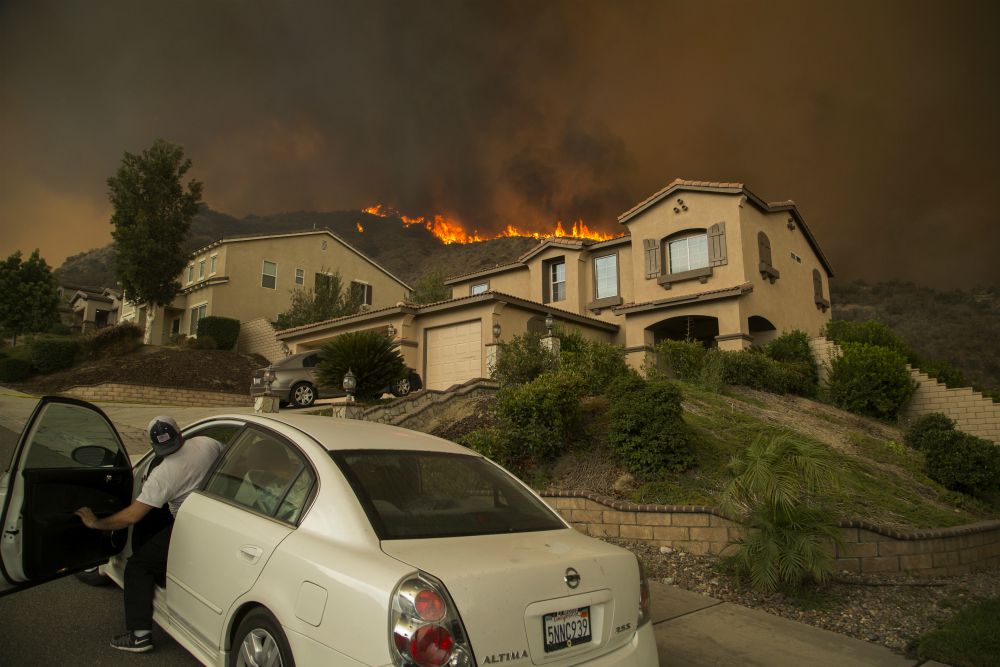
A resident gets into his car as flames approach homes during the Holy Fire Aug. 9, 2018, in Lake Elsinore, California. (CNS/EPA/David McNew)
From words to action
In the pastoral statement's second half, titled "Living Our Ecological Vocations," the bishops outline a series of steps Calfornians can take to better care for creation.
They begin by pledging to "commit ourselves to fulfilling our calling to lead the Catholic Church and its institutions in life-giving responses to Laudato Si'." Specifically, they promise to support clergy, pastoral leaders and ministers in integrating the encyclical into worship services, and to examine their institutional operations "to determine the full extent that we can adopt renewable energy, energy efficiency and water conservation practices."
In addition, the bishops said they would explore "opportunities for divestment from fossil fuels, whether through Diocese bank investments, oil leases, etc."
While numerous religious congregations and Catholic universities have committed to fossil fuel divestment, no U.S. diocese has yet to take the step. The Los Angeles Archdiocese itself has come under fire for an urban oil well on land they own that has led to health issues for neighborhood residents; the archdiocese has said it is exploring alternate options for the land.
Declaring that "Pope Francis calls for more than the presentation of scientific information," the bishops asked parents, teachers and catechists to "create an environmental consciousness within all Catholic families" and to weave Laudato Si' into lesson plans. They challenged all California classrooms to enhance environmental literacy and education, in part through experiential learning outdoors and with an emphasis on ecological ethics.
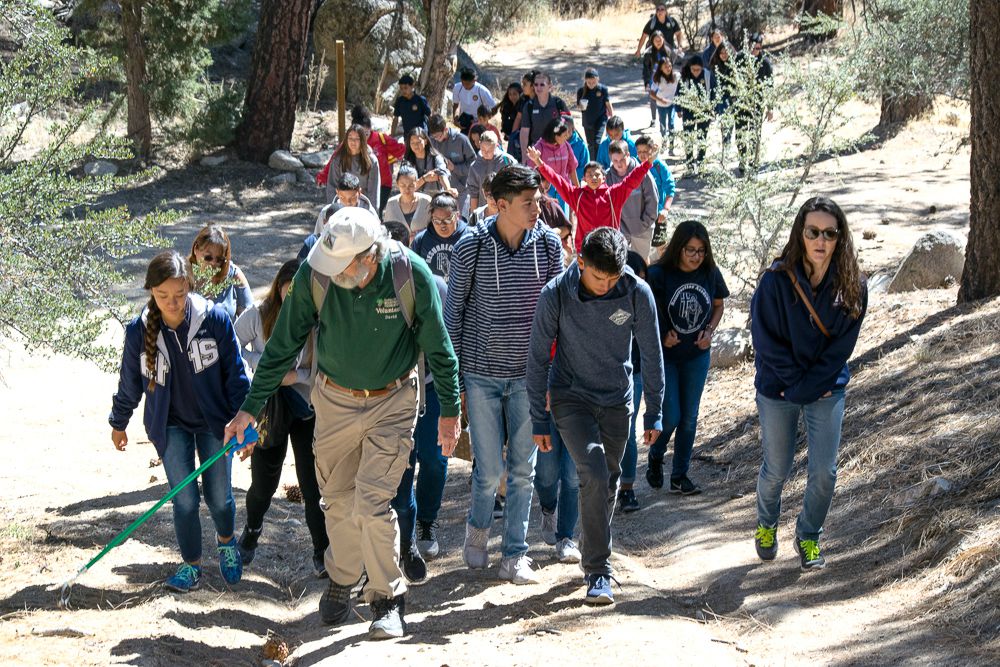
On Care for Creation Day 2017, Naturalist David Johnston leads participants on a hike through the San Bernardino National Forest. (Courtesy of the San Bernardino Diocese)
The bishops invited young people to find ways to embrace integral ecology in their daily lives, take part in community environmental projects and take time to pray in nature. They also urged them to consider how future careers can balance personal needs with creation care and to engage political discussions by advocating for environmental justice.
The bishops challenged public officials to take steps to strengthen the state's water systems and continue measures to reduce carbon emissions to combat climate change and improve air quality. They lent support for programs aimed at providing financial relief on energy and water costs for seniors and low-income families, and challenged state leaders to prioritize environmental projects for disadvantaged communities, especially those facing threats to their health.
They suggested business leaders read and pray over Laudato Si' and examine how their companies can support sustainability and creation care. The bishops asked artists and innovators of Hollywood and Silicon Valley, among other places, "to inspire a culture of care in the human family" and to develop technology for the betterment of the planet.
"It is our hope that this pastoral statement will inspire creative, life-giving responses here in California," the bishops wrote.
Advertisement
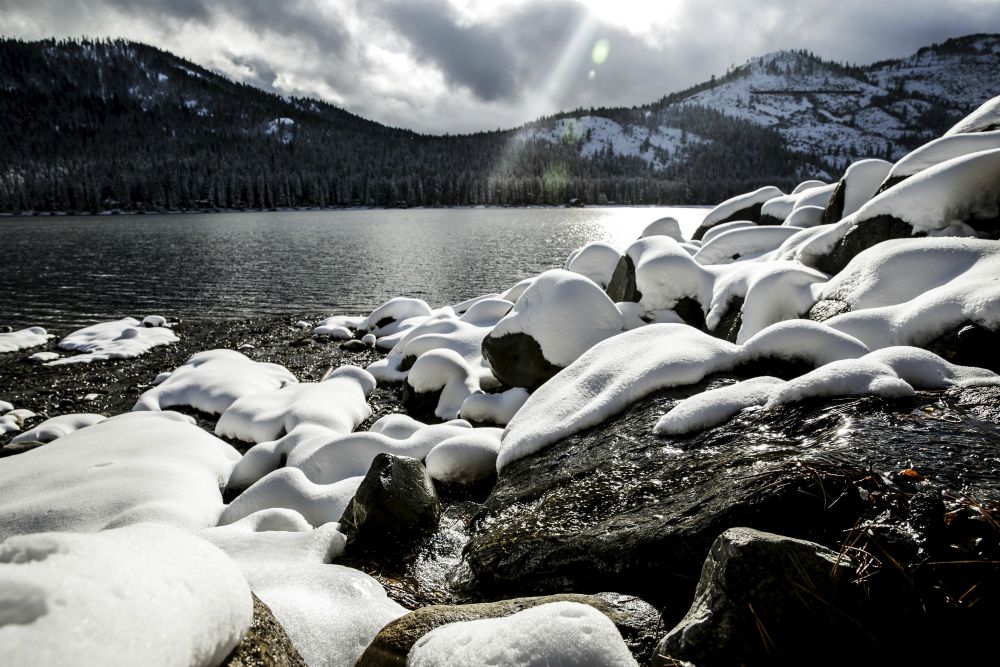
Snow melts into Donner Lake near Truckee, California, Dec. 4, 2015.(CNS/Reuters/Max Whittaker)
Other dioceses stepping up
In the four years since Francis issued Laudato Si', it has taken root at the diocesan level in varying degrees. In 2017, the Diocese of Burlington, Vermont, held a Year of Creation across the Green Mountain State.
In February, the Minnesota Catholic Conference issued a Laudato Si' education resource of its own called "Minnesota, Our Common Home." Approved by the state's bishops, it was written "for the person in the pew" to help them consider how faith relates to the natural environment.
"The central message of Laudato Si' is integral ecology, which is a way of caring for both the natural and human ecologies and doing justice to both. … This document is intended to help the faithful apply this call to integral ecology in their own local context — right here in Minnesota," said Jason Adkins, executive director of the Minnesota Catholic Conference, in a press release.
Catholic institutions in California have also been active.
Several dioceses, including those in San Diego and Monterey, have made strides to install solar arrays; a third of Monterey's church-owned facilities are now powered by the sun. In 2016, the San Francisco Archdiocese hosted a workshop for parishes and schools to respond to Laudato Si'.
Santa Clara University's Warner told NCR that such efforts have stood as "tender shoots" that show that steps to care for creation can indeed be taken. With the bishop's pastoral statement, he sees the potential for the pope's messages on the environment to reach more people in California. And through the natural world around them, perhaps inspire in Californians even greater focus on caring for creation in their daily lives and through wider efforts.
"Ecological conversion challenges us to advance in culture, to grow spiritually, and to be better educated about the world entrusted by God to our care," the bishops wrote. "The heavens and the earth belong to God, but we have been called to be good stewards."
[Brian Roewe is an NCR staff writer. His email address is broewe@ncronline.org. Follow him on Twitter: @BrianRoewe.]
*This article has been updated to clarify California's legislative goals on addressing climate change. In September, then-Gov. Jerry Brown signed a bill to committing the state's electricity grid to generate power from carbon-free sources by 2045. Brown also issued an executive order directing the state to be carbon neutral by the same time.





